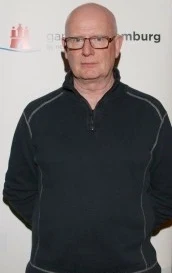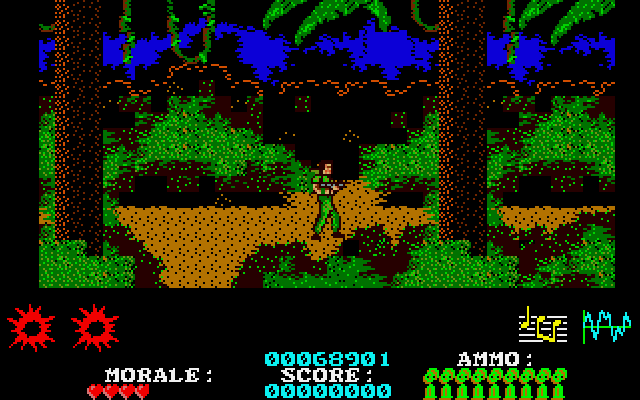Earlier this year, I was fortunate to buy Defender II in mint condition, and I shared a photograph of it on Twitter. Now, I'm not a fan of social media, but it got many likes and even a response from none other than Simon Butler: the fella who designed much of the awesome graphics for this fantastic shooter! Not to mention many more ST games.
For me, talking to anyone from the 16-bit industry is always a surreal moment. Think about it, these are the people behind the games we bought and played. Not only that, but years later, we get to meet and chat with these legends. It's weird, but a nice weird. ;-)
Simon worked on several games and is credited with many Atari ST games: Addams Family, Gazza II, Platoon, and Star Breaker (I need to review these games!!). Wait, there are more under his belt, which I've already featured right here on AtariCrypt: 9 Lives, Elf, and Badlands Pete. A mixed bag, alright with one thing in common - awesome visuals!
I found Simon to be frank and straightforward, yet humble and possibly unaware of the joy he brought with his pixels. I would like to thank him for kindly taking the time to chat, and I hope y'all enjoy this interview.
Simon Butler - The Interview
Hello Simon, please tell us a little about yourself
I entered the games industry in 1983 almost as it began. Imagine software was in its infancy and my best friend Steve Cain was head of the art department there. He asked me to help on a project, Pedro’s Garden even though I had never done any game graphics before, but who had? I did two days of work and was paid a ridiculous amount of money. Regardless of my regular calling into the Imagine office to see friends, I never thought that this was going to be my career for the next forty years.
I made my way through the 8-bit days, working at independent development houses and finally found myself in-house at Ocean Software. While there, I honed my craft, such as it is until I got itchy feet and wanted to work on the 16-bit machines. At the time, this was not on the horizon for Ocean, so I quit and went to work with Steve Cain again at his new company Frames. It was here that I first encountered the Atari ST.
Was it fun working for Arc and Ocean?
It was just a job. It didn’t matter who I worked for, and the only real exception was that bigger studios gave you a more concrete sense of permanence, while smaller teams lived from day to day and the spectre of it all falling apart was always looming at the edges. I did my fair share of freelance work from the spare room in my house as this was par for the course for a solo pixel pusher. (I love that description, pixel pusher! -Steve)Not the best game in the Atari ST's catalogue but the comical sprites are exceptional.
What software tools did you use?
I rarely sketched on paper by this point in my career as I found it almost as quick to simply doodle on the screen. So the software I used was Degas Elite which wasn't as powerful as the tools found on the Amiga, but it suited me. And I thought I was more than reasonably proficient at the time.
Did you enjoy creating back then?
I enjoyed creating the graphics for Nine Lives as I was given carte blanche to do what I wanted. Even though the project was less than amazing on release due to an appalling push scroll.
I loved every minute of working on the Addams Family, regardless of the main platform being the Snes, but I beavered away on my Atari ST at home and in the Ocean office like a madman. I had total freedom, and I just threw out sprites like there was no tomorrow. It was one of the very few occasions in my career where every day was an absolute joy. (This shows because the Atari ST game looks so beautiful - Steve)
Addams was fun from start to finish and I still have one or two examples of the work I did to this very day...
Star Breaker is really cool. No?
I was still using Degas at that point. It was a title for ARC games and at that point I was working for Frames, another company formed by Steve Cain. I vaguely remember all manner of graphical restrictions on this one so unsurprisingly, I was less than happy with the finished product.
What happened with Gazza II?
This was a title I worked on for the laughingly names Active Minds. We were up against the clock from day one and the game design was virtually non-existent as such. We did the best we could while also working on Total Recall. It was one of the worst-managed companies I have experienced and that is saying something.
What involvement did you have with the underrated Platoon?
I did the design for Platoon while at Ocean. They sent me to London to watch a private viewing of the movie months before it was released! I did storyboards for every level and oversaw production on each version. It received good reviews at the time and is one of the titles I am most proud of being involved with.
Platoon is a really good game I thought. Must play it some more and get a review done!
What involvement did you have with Elf?
My involvement with Elf was merely the bitmaps between levels, so I can take no credit for the in-game graphics. They were certainly impressive, but I personally felt the game was lacking in certain areas, but others thought otherwise. Either way, it was yet another title on my CV.
What about your role in Defender II?
I was working on another title at the time and, through this project, I was somehow brought in to do a few bits on Defender Two. I have vague memories of doing spaceship animations, but whether they found their way into the game is anyone’s guess. I do know that the title screen is mine as I spent a lot of time trying to emulate the style used in the logo for a hair-metal band I liked back then. I was quite happy with the result.Elf is an adventure of epic proportions although it appears not so for Simon!
Who inspired you?
There were pixel pushers I thought had done a sterling job on this title or that, but I never aspired to emulate them, nor did I feel I was in competition. As I said before, it was a job. I pushed pixels and if my art manager was happy and the salary cheque cleared every month then all was fine in the world of Simon Butler. A very mercenary view perhaps, but I had a family to provide for and artistic integrity doesn’t pay the bills.
Any funny tales to tell?
I have plenty of funny stories from my tenure in the industry, but any that might be ST related seems to have disappeared along with my hairline! (Yikes, I never expected that reply - Steve)Badlands Pete. The visuals are marvellous and I love the tones with their dusky palette.
Do you still have that Atari ST?
I cannot recall how I managed to acquire my Atari ST that served me so well in my 16-bit freelance years but I do know that I sold it to a friend. These days, I have no old hardware as I am vehemently anti-old school.
I see them as dust hoarders that have no place in my life. As the years have mounted up I have slowly de-cluttered the parts of the house where I stored vinyl, cassette and CD albums, movies on VHS and DVD and what few things I have from “back in the day” are all stored digitally.
Any final words to share?
Since 1983 when I stumbled blindly into pixel pushing I have continued to do exactly the same thing, push pixels. I am still professionally involved in game development and, if truth be told, have taken time off from doing spot effects for my latest game in order to answer these questions. There have been highs and lows, but this whirlwind ride is something I never planned and would not have missed for the world.
I’m a gamer and a game creator and this is not only something I am eternally grateful for it is a badge of honour I will defend against the Johnny-come-lately types of the YouTube brigade who profess to be historians of my past. If anyone is playing anything from the ST era that bears my name I can only apologise.
We tried our best, but if it makes you smile, then we got it right. (Got it dead right I'd say - Steve)








No comments:
Post a Comment
Don't be anonymous, leave your nickname.
/|\